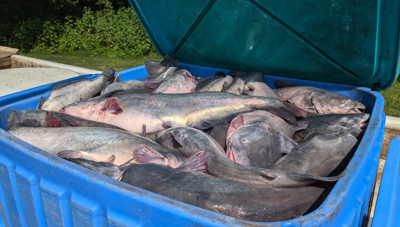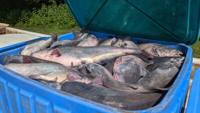CHESAPEAKE BAY - Multiple Congressional Representatives from Maryland and Virginia have joined forces to introduce a unique federal response to the growing threat of invasive blue catfish in the Chesapeake Bay - one that could see the fish being used in pet food.
On Monday, July 7, Congressman Steny Hoyer (D-MD), Congresswoman Sarah Elfreth (D-MD), and Representatives Jen Kiggans (R-VA) and Rob Wittman (R-VA), introduced the bipartisan Mitigation Action and Watermen Support (MAWS) Act. The new legislation aims to combat growing blue catfish populations in the Chesapeake Bay and watershed that threaten both the local ecology and economy, according to the lawmakers.
Representatives say the MAWS Act would establish a pilot program within the NOAA Chesapeake Bay Office to oversee the creation of a new market for Chesapeake Bay blue catfish. The new market would see the troublesome but highly-edible fish’s expanded use in the pet food and other related industries.
"The Chesapeake Bay is central to our way of life in Coastal Virginia. It supports thousands of jobs and feeds millions of people, but its future is under threat from invasive blue catfish,” said Congresswoman Kiggans, who represents Virginia’s Eastern Shore. “The MAWS Act is a creative, bipartisan solution that helps our watermen, protects native species, and turns an environmental challenge into an economic opportunity. By building a new market for blue catfish in pet food, we can strengthen the Bay’s ecology and the seafood economy that depends on it.”.
The MAWS Act would also direct NOAA to make grants available to pet and animal food manufacturers, allowing them to fairly pay watermen for their catches and incentivize growth of an industry including transportation, processing, and manufacturing.
During the proposed two-year pilot program, MAWS would also allow NOAA to collect data on invasive blue catfish populations to monitor the program’s success. Researchers would also collect information on the economic impact on watermen and the market response from pet and animal food manufacturers, according to the bill’s sponsors. Should MAWS prove successful, legislators hint that it could be expanded to include other invasive species. The Chesapeake Bay has also seen a rise in similarly-destructive Chesapeake Channa, or snakeheads.
For now, MAWS focuses only on the blue catfish, which lawmakers say have no natural predators in the Chesapeake Bay and are voracious eaters of blue crabs, rockfish, and oysters. The invaders not only negatively impact ecological diversity in local waters, but also wreak havoc on Maryland and Virginia’s seafood industries and watermen’s livelihoods.
“Having grown up on the Chesapeake Bay, I understand how important it is to protect our marine wildlife and restore the Bay’s ecosystem,” said Congressman Wittman. “Since their introduction, blue catfish have become an invasive species, posing a growing threat to the biodiversity of the region’s waters and inflicting economic damage to the seafood industries that rely on the Bay. I am proud to join Representative Elfreth in introducing the MAWS Act, which will create a new market to incentivize the harvest and sale of blue catfish while providing valuable data for future efforts to combat invasive species in our waterways.”
In their joint statement announcing the bill, congressional representatives included words of support for MAWS from pet food industry leaders, sportfishing advocates, wildlife researchers, and environmental groups including the Chesapeake Bay Foundation.
“Blue catfish pose a clear and present danger to valuable native Bay species like blue crabs and striped bass. Finding and standing up new markets for this invasive species, like the pet and animal food industry, is essential to keeping its numbers in check. So is ensuring that it makes economic sense for watermen to catch them. The Mitigation Action & Watermen Support Act does both, which is why the Chesapeake Bay Foundation is pleased to support it,” said Keisha Sedlacek, Chesapeake Bay Foundation Federal Director.
The proposed legislation’s full text is available here.


